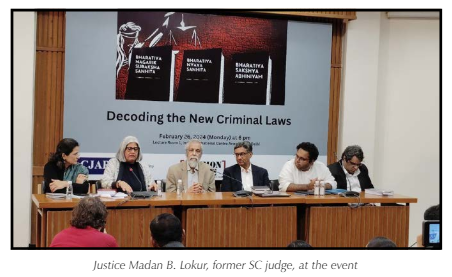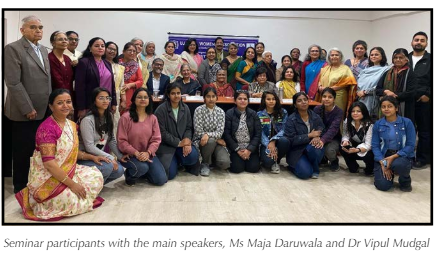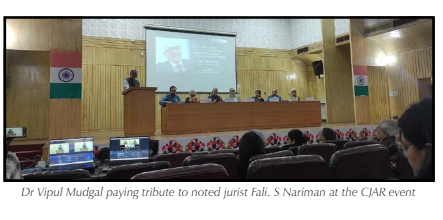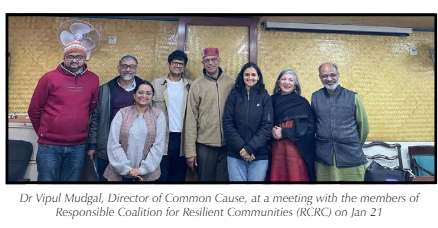Common Cause Events
Jenitta Sabu *
Three Newly Introduced Criminal Laws

Common Cause, in partnership with the Campaign for Judicial Accountability and Reforms, (CJAR) organised a panel discussion on ‘Decoding the Three Criminal Laws’ on 26th February 2024. The idea was to discuss and analyse the newly introduced laws whose stated purpose is to decolonise the Indian justice system and ensure timebound completion of trials. The new laws will replace the IPC (Bharatiya Nyaya Sanhita) CrPC (Bharatiya Nagarik Suraksha Sanhita) and the Indian Evidence Act (Bharatiya Sakshya Adhiniyam).
The main speakers were Justice Madan B Lokur, former judge of the Supreme Court of India, Prof. G Madan Gopal, former director of the National Judicial Academy, Ms. Vrinda Grover, senior advocate, Prof. Anup Surendranath, Professor at the National Law University, and Advocate Mr Sarim Naved. The discussion was moderated by activist and civil society leader Ms Anjali Bhardwaj. The meeting started with the Director of Common Cause, Dr Vipul Mudgal welcoming the guests and speakers after giving a brief introduction of the two main organisers, CJAR and Common Cause.
Ms Anjali Bhardwaj first gave a brief history of the three laws and the background of their replacement with the newly minted laws. She also expressed her concern over the lack of public discussion on these laws which do not necessarily do justice with their stated objectives. She gave the example of the definition of sedition under the old laws which is now being replaced by the word ‘treason’ whose definition makes it much more draconian in letter and spirit. She also talked about the vagueness of the clauses concerning laws related to misleading information or misinformation.
Noted jurist Prof. Mohan Gopal drew the audience’s attention to the widening scope of the Unlawful Activities Prevention Act (UAPA). He said that the new terrorism act was “simply a copy of the UAPA”. Adding to the concerns of the moderator, he commented that the present government did not just do away with sedition, but it had come up with a more sinister combination of sedition and treason. He said that the sections in the newly introduced Bhartiya Nagarik Suraksha Sanhita have widened the ambit of police powers. He said a simple act of disobeying lawful instructions of police personnel will now lead to a 24-hour detention.
Ms Vrinda Grover said that the new laws seem to be aimed at converting the citizens into suspects and supplicants. Sharing her strong suspicion, she said the new laws seemed to be aloof from the Indian Constitution bears a greater resemblance to the colonial laws. She pointed out how these laws were silent over control and torture as well as how there is “no suraksha of the naagrik in the Bhartiya Naagrik Suraksha Sanhita”. She said the current laws have replaced the judicial magisterial inquiry with magisterial inquiry in cases of torture in police custody, which diluted the role and power of such an inquiry. The human rights lawyer said she believed that the newly enacted law would only heighten the ability of the police to coerce and torture ordinary people. Another important aspect in which the law is silent, she pointed out, is about the protection of trans persons, while it also neglects the women’s right to decide on abortions.
Prof. Surendranath stated that the new treason law is far worse than the present UAPA. He said that the current laws have staggering provisions on bail, especially for prisoners, wherein bail provisions for incarcerated prisoners are shrunk to half of the period of their maximum sentence. Advocate Naved Sarim said while not very much has changed, the new laws were definitely going to create a lot of confusion. Mr Sarim felt while the police would have the ultimate choice to prosecute an accused under the new laws, there were very few restrictions on the power of police personnel. He said the idea of community services was good but it was vague and undefined under the new law. Another area of concern in the news laws for him was the inadequate defence of human rights and the dangers it posed to the freedom of speech and expression
“Gaps in Justice – Way Forward”, February 26, 2024
Common Cause was invited to make a presentation at a seminar on “Gaps in Justice- Way Forward” organised by Ujjawal Women’s Association, New Delhi on February 26, 2024. The event was attended by the members of several of Delhi’s well-known women’s organisations. The event aimed at deepening the understanding of the gaps in India’s justice system in order to evolve suitable interventions, especially on issues concerning women. It was also intended to expand awareness and reach of the India Justice Report (IJR) and the Status of Policing in India Report (SPIR) to the audience.

The findings of the two data-based reports were presented by Ms Maja Daruwala, Chief Editor, India Justice Report, a collaborative venture of many civil society partners, and Dr Vipul Mudgal, Director and Chief Executive of Common Cause along with his colleague and legal consultant Mr Udit Singh. A lively question-answer session and community lunch followed the event.
Court Administration and Management
Major Focus and Concerns

Common Cause team participated in a well-attended seminar organised by the Campaign for Judicial Accountability and Reforms (CJAR), The Wire and the LiveLaw, on “Supreme Court Judicial Administration & ManagementIssues & Concerns…” at the Indian Society for International Law, New Delhi, on February 24, 2024. The seminar began with Common Cause Director, Dr Vipul Mudgal, paying tribute to Fali S Nariman, one of India’s best-known jurists of our times and a Senior Advocate at the Supreme Court, on behalf of the civil society organisations.
Dr Mudgal remembered Fali S. Nariman not only as an eminent lawyer but also as a public-spirited citizen who represented and stood for the universal values he believed in. He said that India’s civil society, in a broad pluralistic sense, will remember Mr Nariman as someone who took up vital public causes and fought for constitutional values and human dignity. He said Mr Nariman was always available to take up causes pro bono on behalf of the marginalised. The seminar brought together former judges of the Supreme Court and High Courts, academicians, activists, lawyers and students.
Money and Muscle Power in Indian Elections
Common Cause participated in a conference organised by the Association for Democratic Reforms (ADR) and National Election Watch (NEW) at the India International Centre on March 10, 2024 on the theme “General Elections 2024: Issues, Challenges & Opportunities”. The programme was divided into two sessions, ‘Integrity & Inclusiveness of Indian Elections’ and ‘Money, Muscle, and Election in India’. Common Cause Director Dr Vipul Mudgal, who is also a trustee of ADR, chaired the second session. The main speakers in the session were Justice Madan B Lokur, former judge of the Supreme Court of India, Ms Reena Gupta, State Secretary of Aam Adami Party, Mr. Krishna Allavaru, Joint Secretary of the All-India Congress Committee and National Incharge of the Indian Youth Congress, and Dr Jeet Singh Mann, professor and director of Centre for Transparency and Accountability in Governance, at the National Law University, Delhi.
Initiating the session, Major General (Retd) Anil Verma, head of ADR & NEW welcomed the audience and the speakers. Dr Mudgal introduced the subject and invited speakers to share their experiences regarding campaign expenditure, the winnability of candidates with criminal antecedents, factors driving voting behaviour on money and muscle power, and the low representation of women and youth in the elections. He said that money power and muscle power were intricately enmeshed and difficult to separate from one another.
Justice Lokur focused on the broader context of money power, highlighting the recent Supreme Court judgement on electoral bonds, which clearly showed that money is central to elections and that the political parties will go to any length to acquire money and muscle power. Expressing his satisfaction with the Supreme Court declaring the electoral bonds unconstitutional, he said there was an urgent need for making political parties more accountable.
Ms Reena Gupta, State Secretary of Aam Adami Party, started by questioning the sudden and mysterious resignation of one of the election commissioners just a day earlier. She highlighted the need for disruptors and robust institutions for the survival of democracy. She suggested that the political parties must be brought under the right to information (RTI) so that they disclose their sources of funding. Mr Krishna Allavaru of the Congress emphasised the role of the institutional muscle, particularly of institutions like parliament, executive, media, and judiciary in countering the systemic ills. Dr Jeet Singh Mann highlighted the fact that there was a lack of demand for honesty and integrity in India’s electoral process. Terming money as the lifeline of elections, he said that all political parties were responsible for creating and using black money. The session was followed by a vibrant question-answer session.
Survey to Grasp Post Covid Affects

Common Cause Director Dr Vipul Mudgal participated in a brainstorming meeting with the members of the RCRC coalition. The members include Mr KP Krishnan, IAS (Retd), Ms. Wilma Wadhwa, Director, ASER Centre, Mr M R Madhavan, PRS (in informal capacity), Dr. Sonalde Desai, University of Maryland and NCAER, Mr Ved Arya, Founder Director of the Budha Institute, noted economist Mr Vijay Shankar, among others
The RCRC is a large civil society collaboration that came up after the outbreak of the Covid pandemic. Learning from the experience of the CSO partners, RCRC initiated household surveys to capture the impact of COVID-19 on rural communities and how lives and livelihoods have been affected on account of this impact. Since the COVID crisis is one with a lasting impact in rural areas, RCRC wanted to capture the critical pathways through which communities move out of this crisis and how the government programs and community institutions fare in that process. With this objective, RCRC, with the support of its partners, conducted three rounds of large sample household surveys over the last 11 months. These surveys attempted to assess the long-term impact of the pandemic on aspects like job loss, income loss, reduced food intake, low nutrition and poor health and education outcomes as well as the response of the rural communities and community institutions to the crisis. These surveys also highlighted the robustness of community institutions in building community resilience and the efficacy of programs like MGNREGA in addressing distress at scale.
NEXT »



